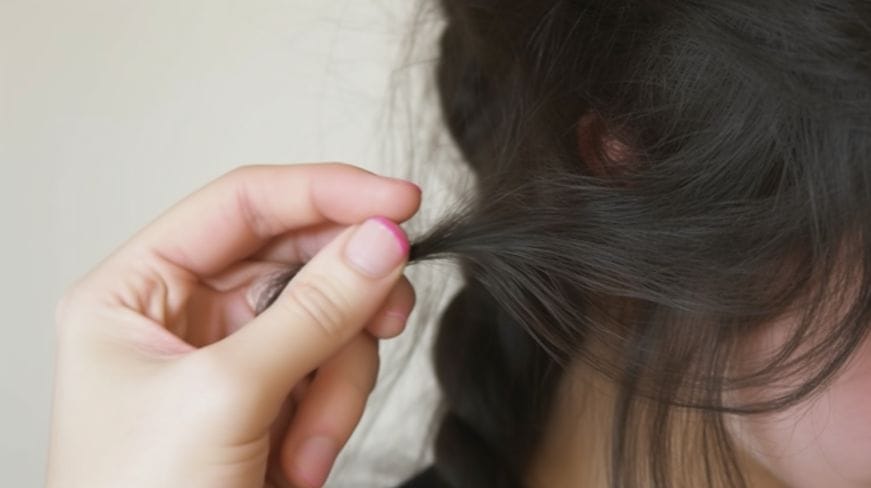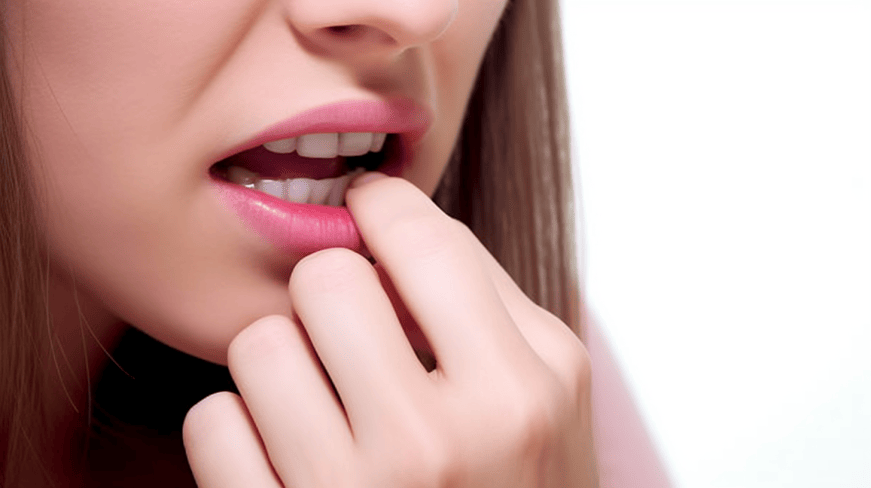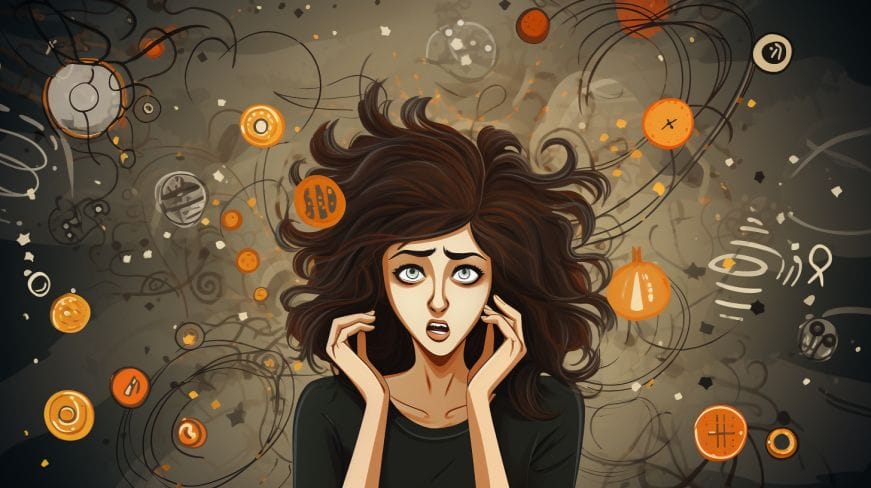Without a doubt, I am thoroughly familiar with typical anxiety indicators like incessantly moving about or biting my nails. These are symptoms I’ve encountered and understand their implications. Yet, what is the wider perspective of this scenario?
In this article, I’ll delve into these everyday habits, their psychological implications, and how they’re linked to our mental health. If you want to understand or overcome your nervous habits, you’ve come to the right place.
Let’s unpack this together.
Key Takeaways
- Common nervous habits include nail biting, foot tapping, hair twirling, and face touching.
- These habits can have physical implications such as bacterial infections, dental complications, distorted appearance of hands, and spreading germs.
- Nervous habits like fidgeting and obsessive behaviors can be coping mechanisms for anxiety or stress.
- Strategies like mindfulness, substitution with stress balls or fidget spinners, and therapy can help counter nervous habits and improve mental well-being.
Identifying Common Signs of Nervousness and Their Impact

Now, let’s look at how prevalent these nervous habits are.
Have you ever noticed someone avoiding eye contact when they’re anxious?
We’ll also discuss the physical impact of habits like nail chewing and face touching.
Analyzing the Prevalence of Common Nervous Habits (data-driven)
During my research, I’ve found that identifying common signs of anxiety and their impact is essential for understanding the prevalence of these habits. Cracking your knuckles or playing with your hair are typical habits associated with it.
Through analyzing the prevalence, a data-driven approach reveals that habits like the ones involving leg shaking or nail chewing, which is often seen as a nail-biter, are more common than we might think.
This nervous energy manifests itself in ways that can harm our overall well-being. It’s not uncommon for people to keep their nails neat and clean. Still, the urge to bite them can become repetitive, especially in times of stress and anxiety.
A common nervous quirk, drumming your fingers on the table or whirling your hair, might seem harmless. Still, it’s indicative of underlying anxiety that requires attention. It’s essential to comprehend the scale of these habits, not only for self-awareness but also for devising effective strategies for managing this nervous energy.
People often constantly restlessly move or repeatedly tap their fingers when they’re feeling anxious. These habits can be hard to break, and if you’re nervous, you may find it challenging to keep your hands busy in a less distracting way.
Picking your skin or touching your face is another habit associated with nervousness, and it can become repetitive due to anxiety. When you feel the urge to keep your hands occupied, it’s essential to find a way to cope without indulging in these habits.
For instance, keep your hands busy using an object like a pen. This gives us something to do when feeling anxious, which is much better than constantly restlessly moving.
Recognising Eye Contact Avoidance as a Sign of Nervousness
I’ve noticed that a significant number of people tend to avoid eye contact when they’re nervous, which is a clear sign of their discomfort.
This avoidance is a classic sign of anxiety and often indicates a lack of confidence. As a person keen on understanding human behavior, it’s essential to recognize such anxious habits.
Avoiding eye contact can make people appear less trustworthy, so we must become aware of this tendency in ourselves and others. Encouraging and practicing making eye contact can help build confidence and ease anxiety. It’s also a crucial step in creating meaningful connections with others.
Discussing the Physical Impact of Nail Biting and Face Touching
In my exploration of nervous quirks, it’s become clear that anxiety, an abstract noun, frequently manifests physically through actions like nail chewing and face touching, and this affects not only our self-image but also our health.
When discussing these common nervous quirks, it’s crucial to understand their physical impact. Nail chewing, for instance, can lead to bacterial infections, dental complications, and a distorted appearance of the hands. Many people bite their nails as a way to cope with anxiety.
Face touching, on the other hand, is known to spread germs that cause acne or cold sores and can also lead to skin irritation. These habits, often unintentional, highlight the physical toll anxiety can take on our bodies, underscoring the importance of finding ways to manage our stress levels.
It’s essential to keep your nails looking their best and break the habit if you like to learn how to stop. Suppose you find that people will pick up on your habits, especially when giving a presentation. In that case, it may be irritated or impatient.
Understanding the Role of Fidgeting and Implications

Let’s now turn our attention to the role of fidgeting and its implications.
We’ll look into the psychology behind actions like foot tapping or touching your hair and explore what happens when pencil twirling turns obsessive.
We’ll also share anecdotes about how these seemingly harmless habits can become more obsessive.
Investigating the Psychology Behind Tapping Your Foot and Touching Your Hair
I’m about to delve into the psychology behind two common nervous quirks – foot tapping and hair touching – to understand better the role and implications of restlessly moving.
Tapping your foot is often seen as a sign of restlessness or impatience, but it’s actually a coping behavior. It’s a way to release anxious thoughts or excess energy, helping to regulate emotional states.
Similarly, touching your hair can be more than just a habit. It’s a self-soothing behavior that can provide comfort during stressful situations.
Understanding these habits from a psychological perspective can help us better manage them, turning them from irritating quirks into tools for emotional regulation.
The Consequence of Compulsive Pencil Twirling
Now we’re moving onto obsessive pencil whirling, a common nervous habit, and its implications, which are more significant than you might initially think. Like tapping your foot or touching your hair, uncontrollably whirling a pen is another habit that can be an indication of anxiety and stress. However, it might also be related to boredom.
- Distraction: It can be a distraction not only for you but also for others around you. Your focus is divided between the task and the pen you keep whirling.
- Physical Strain: Continuous restlessly moving can cause strain in your fingers, leading to pain or discomfort. If you experience this, you may need to see a doctor to address any physical issues.
- Impression: Over time, this obsessive habit may leave an impression of anxiety or lack of confidence in others. It’s something to remember when interacting with people in various settings. You might be asked to repeat yourself more often if your body doesn’t appear organized due to this habit.
Anecdotes About Escalating Fidgeting into Obsessive Habits
In my experience, restlessly moving, though often dismissed as a minor nuisance, can escalate into an obsessive habit, and understanding the implications of such a progression is essential for managing it effectively.
For instance, a simple compulsion such as hair whirling may turn into trichotillomania, a disorder characterized by the irresistible urge to pull out one’s hair. This is where developing coping mechanisms becomes crucial.
For a clearer understanding, let’s look at the table below:
| Anxiety Habits | Compulsion | Coping Mechanisms |
|---|---|---|
| Hair Twirling | Mild | Deep Breathing |
| Nail Biting | Moderate | Mindfulness |
| Hair Pulling | Severe (Trichotillomania) | Therapy |
According to the Association of America, understanding the role of restlessly moving and its potential escalation helps manage these habits more effectively.
Addressing the Significance of Oral Compulsive Habits

Now, let’s focus on the significance of oral obsessive habits.
We’ll explore the link between nail chewing and anxiety, the harm and solutions associated with teeth grinding, and the scientific reasoning behind bite compulsiveness.
Exploring the Connection Between Nail Biting and Nervousness
I’m going to delve into the significant link between the common nervous quirks of nail chewing and feelings of anxiety, highlighting the importance of understanding oral obsessive behaviors.
The connection between nail chewing and anxiety is well-documented and is often seen as an indication of anxiety.
Here are three key points to consider:
- It often manifests in situations of stress, indicating a coping mechanism.
- It’s a physical representation of internal discomfort, often subconsciously done.
- Prolonging can lead to health concerns, emphasizing the need for intervention.
Understanding these common nervous quirks provides insight into our emotional states, helping us address these signs of anxiety effectively. By recognizing and managing these behaviors, we can promote healthier responses.
The Damage and Solutions of Grinding Your Teeth
Grinding your teeth, a habit many of us unconsciously adopt, wreaks havoc on oral health, but don’t worry. There are practical solutions we can explore. Known as bruxism, this compulsion can lead to jaw pain, headaches, and even tooth loss. The damage of grinding your teeth goes beyond physical symptoms, often indicating underlying stress or anxiety.
Don’t despair. The solutions to teeth grinding are accessible. One option is a custom-fitted mouth guard to protect your teeth during sleep. More holistically, consider seeing a mental health professional to address potential emotional triggers. They can provide techniques to manage stress, reducing the chance of bruxism.
With the right approach, you can overcome this damaging habit.
Scientific Explanation Behind Bite Compulsiveness
Let’s delve into the science behind bite compulsiveness, an oral habit more significant than we often realize. Chewing your nails or your knuckles is one of the most common nervous quirks. The scientific explanation behind it is fascinating.
- It’s a form of self-soothing: It provides comfort in times of stress, worry, or fear.
- It’s a distraction: It can divert attention from a daunting task or situation.
- It’s a release of pent-up energy: It serves as an outlet for excess energy that’s built up.
Understanding the science behind these habits, we can better address them and seek healthier alternatives. After all, mastering our habits is a crucial step towards self-improvement.
The Intricate Link between Physical Nervous Habits and Mental Health

It’s clear to me that our physical nervous quirks are intensely connected to our mental health. For instance, consider how stress can manifest as shaking hands or how obsessive knuckle cracking can impact our mental state.
We’ll also look at strategies to counter these physical signals of anxiety, as they can be crucial in maintaining a healthy mind.
Shaking Hands as a Physical Manifestation of Stress
Although I’m not a medical expert, I’ve noticed that when I’m under stress, my hands tend to shake, demonstrating the complex relationship between physical nervous quirks and mental health. This shaking, a physical symptom of stress and anxiety, reveals how our bodies react to pressure.
When I experience anxiety, my body’s fight or flight response kicks in, unintentionally resulting in shaking hands. It’s a sign that my body is preparing for a perceived threat.
This response can be more pronounced in some, depending on their stress tolerance and overall mental health.
Mindfulness techniques can help manage this physical response, proving that mental health practices can influence our bodily reactions.
My experience underscores the intricate link between the mind and body, especially in stress scenarios.
The Mental Effects of Compulsive Knuckle Cracking
I’ve suffered from two main nervous quirks over the years, obsessive knuckle cracking being one of them, and I can’t help but notice the mental toll it’s taken on me.
It’s more than just the physical act; it’s the mental effect of obsessive knuckle-cracking. It’s an anxiety disorder that manifests physically, causing me to crack my knuckles constantly. Though it seems like a harmless bad habit, it’s a coping mechanism for stress, providing temporary relief from my anxiety.
However, the relief is short-lived, and the anxiety quickly returns, creating a vicious cycle. Moreover, the constant need to crack my knuckles disrupts my focus, affecting my productivity.
This goes to show how physical nervous quirks can have profound mental health implications.
Strategies to Counter Physical Habits Signalling Nervousness
In grappling with these physical habits that signal anxiety, I’ve come to realize that they’re not just quirks but indicators of my mental health. I’ve found strategies that can help counter them. These strategies to counter physical habits, signaling it, are deeply intertwined with our mental well-being.
Here are three ways to overcome common nervous quirks:
- Mindfulness: Being aware of when I’m performing these habits helps me curb this habit. Recognition is the first step to resolution.
- Substitution: I keep my hands busy with stress balls or fidget spinners to prevent nail chewing or hair pulling.
- Professional Help: Therapists can provide techniques to counter these habits, showing how physical cues can be indications of deeper mental health issues.
Seeking Help and Personal Methods to Overcome Nervous Habits

Let’s now focus on how we can conquer these nervous quirks.
It’s important to know when it’s time to seek professional help, but there are also personal methods to consider.
We’ll explore mindfulness techniques and DIY exercises that can assist in managing and overcoming these habits.
Recognizing When to Seek Professional Help
I’ll now guide you through recognizing when to seek professional help for overcoming nervous quirks.
It’s vital to understand that if you’re constantly feeling nervous or you suffer from anxiety, it’s okay to seek help. So, when should you reach out?
- When your nervous quirks, such as nail-biting, impact your daily life or cause physical harm.
- If, despite your personal efforts, you’re unable to control your habits.
- When you’re feeling overwhelmed, and your anxiety is escalating.
Mindfulness Techniques to Contain Nervous Habits
My journey’s next step involves introducing you to mindfulness techniques to help rein in your common nervous quirks. It’s a personal method to overcome that constant, gnawing feeling of being anxious. Mindfulness is about being present, focusing on your body and thoughts, and acknowledging them without judgment.
Here’s a simple table to help you understand the concept better:
| Technique | How It Helps |
|---|---|
| Deep Breathing | Calms the body, reduces anxiety |
| Body Scan | Increases awareness of physical sensations |
| Observing Thoughts | Detaches you from your anxious thoughts |
These techniques are ways to stop the cycle of anxiety and nervous quirks. They are not magic bullets, but they are tools that can help you cope with anxiety and create a more peaceful mind space.
DIY Exercises to Manage and Overcome Nervous Habits
While mindfulness techniques can be highly effective, it’s also crucial to explore DIY exercises explicitly designed to manage and overcome nervous quirks. These exercises offer personal methods to conquer common jumpy quirks.
Here’s how to get started:
- Learn how to curb your habits by recognizing triggers. Keep a journal to document when and why the habit occurs.
- Use a stress ball or something to twitch with. It can provide a physical outlet for your nervous energy.
- Practice deep breathing exercises. They can help in calming your nerves and diverting your attention away from the habit.
Frequently Asked Questions
What Are Some Uncommon Nervous Quirks That People Might Not Be Aware Of?
Lesser-known nervous quirks include skin picking, hair whirling, pen clicking, and tapping. People often need to be made aware they’re doing these things. They’re unconscious responses to stress and can become problematic if overdone.
How Can Nervous Quirks Potentially Affect Interpersonal Relationships?
Nervous quirks can affect relationships as they may be seen as annoying or distracting. It’s also possible they’re interpreted as signs of dishonesty, discomfort, or lack of interest, which can create misunderstandings.
Can Nervous Quirks Be Completely Eliminated or Just Managed?
It’s challenging to eliminate nervous quirks, but they can be managed. Through conscious effort, self-awareness, and professional help, you can significantly reduce their impact on your daily life.
Are There Any Benefits to Having Nervous Quirks?
While they’re usually seen as unfavorable, nervous quirks can sometimes serve as coping mechanisms. They can help manage stress, provide comfort, and boost concentration in some situations.
Can Nervous Quirks Lead to Other Types of Compulsive Behavior Disorders?
Nervous habits can evolve into obsessive behaviors. I’ve observed this in clinical settings where simple habits like nail-biting intensify into more severe disorders like OCD or body-focused repetitive behavior disorder.
Conclusion
In a nutshell, nervous habits are common and often linked to mental health. Fidgeting and oral compulsions are signs I’ve come to recognize.
It’s crucial to understand their impact on our well-being. Seeking help and finding personal strategies to overcome these habits is vital. Remember, it’s not just about stopping the habit but addressing the underlying stress or anxiety.
Let’s not ignore these signs. Instead, let’s face them head-on for a healthier, happier life.

